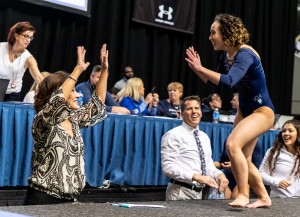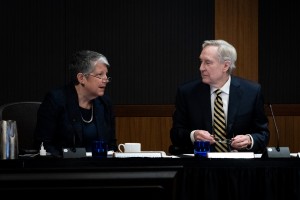This Week in the News serves as The Quad’s space for reflection on current events at and around UCLA. Every week, Daily Bruin staffers will analyze some of the most significant stories to keep readers up to speed.
It’s week two and students are beginning to get comfortable with their new classes. While it may still be the beginning of the quarter, a lot has happened to keep Bruins busy. From UC regent debates to Katelyn Ohashi’s perfect 10, here are the Quad’s picks for this week’s news.
Gymnastics surpasses the competition at Collegiate Challenge with two perfect 10s

UCLA gymnastics took first place at the Collegiate Challenge in Anaheim, California, on Saturday night with a winning score of 197.700.
It was an impressive night for many members of UCLA’s gymnastics team, including senior Katelyn Ohashi, who scored a perfect 10 on her floor routine. Ohashi continued to perform well on the balance beam, scoring a 9.975.
Junior Kyla Ross continued the trend with another perfect 10 on the uneven bars followed by an 9.875 on the vault and a 9.925 on floor exercise. Ross tied her career high of 39.700 in the all-around competition.
Other noteworthy contributions came from freshman Margzetta Frazier, competing on vault for the first time this year with a score 9.825, followed by an almost flawless 9.925 score on the uneven bars. Sophomore Pauline Tratz achieved a 9.850 on vault and a 9.925 on floor exercise along with junior Gracie Kramer, Frazier and Ross.
UCLA gymnastics coach Valorie Kondos Field – or “Coach Val” – said the team’s attitude going into this meet contributed to its success.
The team will go head-to-head against Arizona State on Monday in Pauley Pavilion.
UC student leaders divided in opinion over whether to end student advisor position

Disagreement among University of California student leaders continued in the debate over whether to end the student advisor position Sunday.
The student advisor position was created in 2016 in response to students’ wanting greater representation on the board. However, this position does not have voting power or the ability to attend closed meetings.
The UC Student Association President Caroline Siegel-Singh stood in favor of terminating the position, while leaders like Claire Fieldman, co-chair of the UC Council of Presidents and president of Undergraduate Students Association Council, and Michael Skiles, co-chair of the UC Council of Presidents and president of the Graduate Students Association, felt the position should continue.
Current student advisor Edward Huang agreed the position should remain, claiming the position has been successful in its goal to provide greater student representation. Rafi Sands, former student advisor, added the student advisor has helped with multiple initiatives, citing his involvement in launching the UC Advocacy Network student ambassador program and the creation of a database with the contact information for all student leaders who could help the regents with specific policies.
Despite these accomplishments, the UCSA was in support of terminating the position, claiming the regents should instead expand the roles of previously existing positions, such as Committee Observers and Student Advocate to the Regents, or StARs. Siegel-Singh also recommended the UCSA president should become a permanent StAR and another StAR position should be added to better represent student interests.
“The organization of the position, the real nuts and bolts of the position, doesn’t set up students to succeed in delivering the best feedback to the Board of Regents,” said Aidan Arasasingham, the director of legislative affairs in the USAC external vice president office.
Arasasingham added student advisors are asked to speak on issues that no one student has the knowledge or resources to explain. He argued having a broader set of positions to a greater number of students would provide greater student representation.
The regents’ most recent statement recommends extending the program until 2020 and attacking the program’s current problems. However, the UC Board of Regents voted Thursday to end the position after July. Instead, the board decided to add more Student Observer and StAR positions.
Faculty express concerns over lack of diversity in UCLA Health’s hiring process
Faculty members of UCLA Health raised concerns during a town hall over the lack of diversity in the search committee choosing the replacement of Peter Whybrow after his 20 years as the chair of psychiatry and biobehavioral sciences and director of the Semel Institute for Neuroscience and Human Behavior.
The faculty members questioned the lack of diversity on the committee, which is composed of 11 members – 10 of which were white and eight of which were men. Further, the faculty is unhappy with the proposal to split Whybrow’s role into two separate positions.
Worries that this lack of diversity may cause the committee to overlook qualified candidates from underrepresented communities in Los Angeles permeated the discussion. Eraka Bath, assistant professor of child and adolescent psychiatry, said this committee does not align with UCLA Health administration’s usual emphasis on equality and inclusion.
Despite these claims, the committee technically fits the guidelines set by the Office of Equity, Diversity and Inclusion with 25 percent of search committee members coming from diverse groups. However, women are included in the diversity quotient, something Bath disagrees with.
Further questions were raised regarding the separation of the roles of psychiatry chair from the director position. There are concerns that the separation may make it harder for the positions to serve the mental health needs of Los Angeles to the best of their abilities.
Stephen Marder, an attending psychiatrist at UCLA’s psychosis clinic, said he feels the separation would create issues within the psychiatry chair position as it would lack the necessary resources from the director position. However, Johnese Spisso, president of UCLA Health, reassured faculty that these two positions could work in partnership to fulfill the obligations of the larger community.
Faculty members felt they should be included in the discussion over Whybrow’s replacement. John Mazziotta, vice chancellor of UCLA Health Sciences and CEO of UCLA Health, expressed the board is open to continued deliberations and will continue searching until UCLA Health finds the right person for the job.
